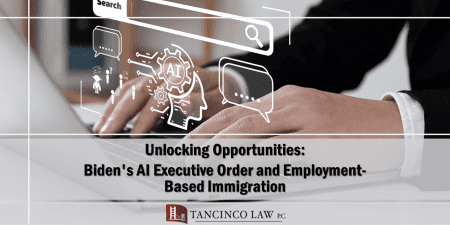Greetings!
We’re excited to share insights into President Biden’s recent executive order on artificial intelligence and its potential to transform employment-based immigration in the United States. This executive order is not just about technology but also focuses on modernizing the Schedule A list, a pivotal move aimed at addressing labor shortages in high-demand sectors and enticing global talent to contribute to vital areas of the country.
Understanding the Impact of Biden’s AI Executive Order on Employment-Based Immigration
President Biden’s AI executive order (Executive Order on the Safe, Secure and Trustworthy Development and Use of Artificial Intelligence) signifies a groundbreaking step in reshaping employment-based immigration laws. A key aspect is the directive for the Department of Labor (DOL) to issue a request for information (RFI) by December 13, inviting public and expert input on “identifying AI and other STEM-related occupations.” This process marks the first significant update to the Schedule A list since 1991, promoting transparency and engagement. At the moment, included in the list are registered nurses and physical therapists.
With this Executive Order the DOL will gather public input to identify specific AI and emerging technologies-related occupation, and other sectors, lacking sufficient U.S. workers. President Biden’s order positions the nation to adapt to economic and skill demands, ensuring relevance in the evolving job landscape.
To ensure accuracy in reflecting current labor shortages and adaptability to future market changes, the DOL is encouraged to employ comprehensive labor market analytics. This data-driven approach involves analyzing unemployment rates, employment growth, wage patterns, and job vacancy rates, fostering a responsive and dynamic Schedule A list.
Beyond Filling Gaps: A Strategy for Economic Growth and Innovation
Modernizing the Schedule A list extends beyond addressing job vacancies; it’s a strategic move to drive progress and innovation in critical sectors like STEM and healthcare. Attracting international talent to these areas solidifies the US as a hub for innovation, complementing domestic contributions and fostering economic growth.
Conclusion:
President Biden’s AI executive order marks a crucial step in reshaping the employment-based immigration landscape, offering predictability and flexibility aligned with current economic conditions. However, a comprehensive approach to modernizing employment-based immigrant visa categories is essential to prevent prolonged wait times for foreign workers. This holistic strategy ensures the United States remains a competitive destination for global talent, propelling economic growth and innovation.
Best regards,
Tancinco Law


